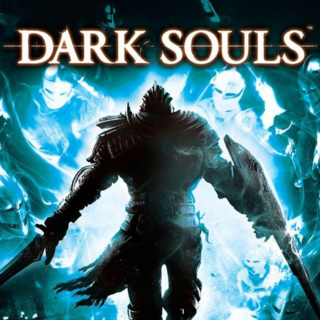At the very beginning, the player character is thrown into the world, clueless about the significance of his being. Explanations and directions are scarce. The environment surrounding the player is ruined, derelict; exposing the decadent age consuming the land. To make matters worse, death is seemingly inevitable, with life-threatening danger looming in every corner. Only an enigmatic prophecy of old presents a faint glimmer of hope.
The game obviously doesn't want the player around, and it's relentless in it's pursuit to relieve the realm of the player's presence. It certainly doesn't let the player feel comfortable, who anxiously ventures in the perilous unknown.
Dark Souls is a remarkable game, both unforgiving and punishing; crushing the unwary with it's iron fist. But for the persistent, whose determination surpasses and defeats the overwhelming obstacles in their paths, the precarious journey to their purpose or destiny is immensely fulfilling. It's a blast from the past, reintroducing the challenge present in many older classics and, unfortunately, deprived from games of today.
There are five strong qualities that easily carry the game to greatness: the versatility and depth of gameplay, the ambiguous storyline, the admirable challenge, the excellent sound design and the well-crafted game world.
The difficulty of the challenge is justified by its fairness; the aforementioned punishment can be severe, with player death resulting in a total loss of currency (Souls, in this case) and humanity (embodiment essential for online interaction), but not before offering the player a second chance to regain it all back.
Hostiles range from easily dispatched, to those requiring caution and learning their patterns, closing with boss fights which can be a good test of tenacity for the most part.
The pacing is contingent on the player, as the number of adversaries is appropriate to their whereabouts. Tawdry moments and cheap death are almost non-existent, and the player can often blame himself for his mistakes rather than the game itself.
Of course, the heart of Dark Souls is the combat system; it features a huge arsenal of weapons, armor and magic rings. The key to success lies in making a good stat/equipment combination, a viable build shaped to your liking; depending on whether you want your character to be a shield-using tank, a rolling rogue preferring dodging to blocking etc. Weapon moves are mostly unique for every weapon, making weapon choice very important for your style of play.
In many of those builds there is often a weak spot that can be exploited by a specific enemy, making the difficulty of such encounters relative.
Collision detection can be an issue, especially in tight corridors, and weapons in full swing often go through walls at the right proximity. Targeting lock-on system is well realized, but can be clunky at times and its improper use can easily cause your character's demise.
World design is where Dark Souls shines the brightest. It's enormous, seamless world has plenty of variety among it's regions; while exploring the mythical realm of Lordran you'll stumble upon forsaken cities, dreary forests, forlorn catacombs, plague-infested swamps and even set foot on sacred divine ground as well as primeval lake isles where all life originated. These areas are intricately connected, displaying glimpses of far-distant levels; what you can see, you can most likely traverse. Largely contributing to the world is the stellar sound design. There is no music while exploring the various death traps and facing regular monsters; the inert, atmospheric ambiance fills the vacant air, with only sounds of death traps and impending horrors lurking around. Music appears only when it's required to. Intimidating bosses are backed by grotesque music, aiming to spread panic. The soundtrack's other use is to honor. Mythical, important places of lore are followed by orchestral music, both epic and heartfelt.
Littered around the earth are chests and corpses of fallen warriors which contain treasure. There is a meager amount of loot randomization, thereby making every item pickup exciting, and more importantly, crucial.
Certainly, the treasures wouldn't be so meaningful if not for their descriptions. This is where lore comes in place and many secrets and mysteries start becoming unveiled. Clues of what happened prior, what takes place now and what is bound to happen are all inscribed in the items' descriptions. Beyond merely depicting lives of rare non-player characters, they tell of a world in turmoil, torn between malevolent sides, deprived of solace and with its people cursed. There is a deep underlying element to the storyline, and it's left ambiguous on purpose. With such a minimalistic plotline, the mystical and/or eerie feeling of discovery is ever-present.
There are a couple of problems that hinder the game's ascent into a masterpiece. Added to the aforementioned problems is that the pacing and the territory of some areas is uneven; while you might beat an area very quickly, other, that is equal in importance, will require an insane amount of time. Bosses can sometimes be completely random, while some are exactly the same fight. The jumping mechanic isn't stellar either, but thankfully it isn't as necessary.
Dark Souls may repel some gamers, understandably so. It's not for everyone and I had a hard time grasping what made it so great. It doesn't care about gaming trends of today, things that we are used to see in its genre and wider. But in its disparage of the mainstream games, it earns a very special kind of audience. An audience that is tenacious enough to appreciate all its subtle design as well as the respect it shows to the older generation.

